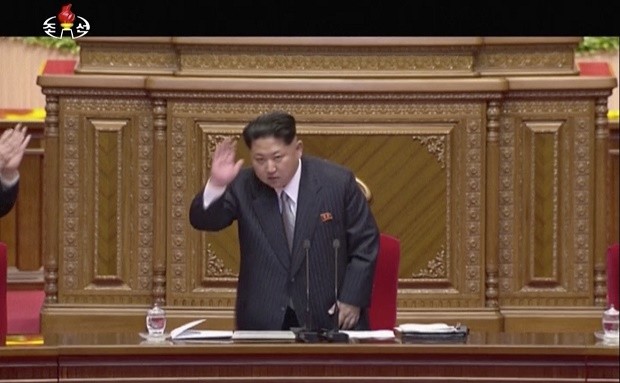UN strongly condemns failed North Korea missiles launches

North Korean leader Kim Jong Un acknowledges delegates’ applause at the party congress in Pyongyang, North Korea, Friday May 6, 2016. North Korea on Friday opened the first full congress of its ruling party since 1980, a major political event intended to showcase the country’s stability and unity under young leader Kim Jong Un despite international criticism and tough new sanctions over the North’s recent nuclear test and a slew of missile launches. AP
UNITED NATIONS — The UN Security Council on Wednesday strongly condemned three recent North Korean missile launches which failed, calling them “a grave violation” of a ban on all ballistic missile activity that contributed to the country’s nuclear weapons program.
The council reiterated its demand that North Korea end its “flagrant” violations, halt all nuclear tests and ballistic missile activity, and comply with five sanctions resolutions imposed since the country’s first nuclear test in 2006.
In a statement approved by all 15 members, the council said the failed launches on May 31, May 27 and April 28 contribute to North Korea’s development of nuclear weapons delivery systems and increase tensions in the region.
The council urged all countries to redouble efforts to fully implement sanctions against North Korea, especially those imposed in March which were the toughest in two decades.
Council members acted in response to what Pyongyang claimed was its first hydrogen bomb test on Jan. 6 and the launch of a satellite on a rocket on Feb. 7, which was condemned by much of the world as a test of banned missile technology. Pyongyang insists that its nuclear weapons are defensive, but has threatened nuclear annihilation.
Article continues after this advertisementThe latest sanctions unanimously approved on March 2 include mandatory inspections of cargo leaving and entering North Korea by land, sea or air; a ban on all sales or transfers of small arms and light weapons to Pyongyang; and expulsion of diplomats from the North who engage in “illicit activities.”
Article continues after this advertisementREAD: South Korea says North Korea missile launch likely failed
The council statement adopted Wednesday directs the Security Council committee monitoring sanctions “to intensify its work to strengthen enforcement” of the resolution. It also calls on all UN member states to report as soon as possible on “concrete measures they have taken” to implement the latest sanctions.
Security Council members “reiterated the importance of maintaining peace and stability on the Korean peninsula and in Northeast Asia at large.”
They “expressed their commitment to a peaceful, diplomatic and political solution to the situation and welcomed efforts by council members as well as other states to facilitate a peaceful and comprehensive solution through dialogue.”
North Korea walked away from six-party nuclear disarmament talks in 2009 over disagreements on how to verify steps the North was meant to take to end its nuclear programs.